- Home
- John Boyne
The Terrible Thing That Happened to Barnaby Brocket Page 3
The Terrible Thing That Happened to Barnaby Brocket Read online
Page 3
“There is something wrong with him, Alistair.”
“I mean, they’ll think he has a skin disease and no one will want to sit next to him. And before you know it, the school authorities will drag us all in to meet the nurse, and who knows what trouble that will cause. They might put it in the newsletter, and then everyone will know that I have fathered a floating boy. No, I’m sorry, Eleanor, but I’m putting my foot down.”
“You’re doing what?” asked Eleanor incredulously.
“I’m putting my foot down,” he repeated in a more forceful voice. “I am head of this household, and I have decided that we’ll have to risk all the ugly stares and cruel gossip. The boy must be brought out into direct sunlight. You can get the ball rolling tomorrow morning when you take Captain W. E. Johns for his walk.”
The dog’s tail wagged at this most wonderful of words—a single syllable that offered unparalleled delights—and Eleanor, too exhausted to offer any more resistance, reluctantly agreed. And so, the following morning—a bright, sunny day, perfect for putting a little color into a pale boy’s cheeks—she clapped her hands to summon Captain W. E. Johns, clipping his lead onto his collar before ascending a kitchen chair to take Barnaby down off the ceiling.
“We’re going for a walk,” she told him in a matter-of-fact voice.
“Around the house?”
“No, outside.”
“Outside?” asked Barnaby, who hadn’t for a moment believed that his mother would do what his father had insisted on the night before.
“That’s right. But before we go—well, I’m sorry about this but there’s something I’ve got to do.”
And with that she retrieved Captain W. E. Johns’s spare collar, which had an expandable neck, and the second lead, which they kept in the kitchen drawer, and a few minutes later all three were on their way.
They made an extraordinary sight as they set off from their home in Kirribilli, making their way along the street that led toward the governor-general’s house at the southernmost point of the peninsula: a middle-aged woman walking along with her head bowed low in shame, a dog of indeterminate breed and parentage trotting a few feet ahead of her as she held his lead in her left hand, while a four-year-old boy, white as a ghost, hovered above them both, suspended in the air by the lead she held in her right.
Barnaby Brocket had become a kite.
They made their way north toward St. Aloysius’ College, where Henry was coming to the end of year five, but once the bell rang and the children could be heard running down the stairs inside, Eleanor turned and walked quickly toward the Jeffrey Street Wharf, where she liked to stand and look across the water at the sails of the Opera House, the sweep of the skyscrapers, and the hotels dotted between them. The Harbour Bridge stood proudly to her right, linking the shores of North Sydney to The Rocks beyond, and she turned to it, staring up toward the flags floating in the breeze, before breathing in deeply and feeling, for a moment at least, at peace.
“Morning, Eleanor!” called Mr. Chappaqua, a former Olympic twenty-kilometer racewalker—Montreal, nineteen seventy-six; fourth place—who passed her at this time every day from the direction of Beulah Street, where he always began his morning constitutional, elbows tucked into his body as he waddled along like a duck in a baseball cap. “Good morning, Captain W. E. Johns!”
And then, looking up, he noticed Barnaby floating above her, and his cheerful expression immediately changed. Mr. Chappaqua was Sydney-born and -bred. He took great pride in the city, its people, and its fine traditions. He’d even stood for a parliament seat a few years before—fourth place once again—and remained a regular letter writer to the Sydney Morning Herald, where he complained about anything that wasn’t in keeping with his standards, which were exceptionally high.
“Your boy is floating, Mrs. Brocket,” he said, appalled, unable to bear the familiarity of her first name now. “He’s floating!”
“Is he?” asked Eleanor, looking up as if this was a tremendous surprise to her.
“You know he is. You have him on a leash! Is this where we’re headed now, Mrs. Brocket? Are these the depths to which Sydney, the most magnificent city in the world, has sunk?”
Eleanor opened her mouth to defend herself but could find no words to explain her son’s behavior, and Mr. Chappaqua, dismayed, simply growled like a roused wolf and marched straight home to Mrs. Chappaqua, who suggested that where there was one, there would surely be more, and before long Sydney would be overrun by the nasty creatures.
And although Eleanor felt humiliated by this encounter, Barnaby was too enraptured by the wonderful new sights that were on display before him to care. He looked down at Captain W. E. Johns, who, sensing his master’s excitement, wagged his tail in delight. He squinted in the bright morning as the sun reflected off the water, inspiring rainbows of color to spring from the waves. Watching one of the ferries making its way from Circular Quay round the curve toward Neutral Bay, Barnaby wished that he could be on board, that he could see what existed even farther away in those places he had never been allowed to visit.
“I knew this was a bad idea,” said Eleanor furiously, turning round and heading back in the direction from which they had come. “We’ll be the talk of the neighborhood now. The sooner I get you back indoors, Barnaby, the better.”
But as they made their way along the street toward home, they were met by another neighbor, or rather a pair of neighbors, named Joe and Alice Moffat, who were something big in computers (or so Eleanor had heard). They were chatting away quite happily as they walked along, hand in hand, but when they saw Eleanor, Barnaby, and Captain W. E. Johns coming their way, they immediately stopped and stared, their mouths falling open in surprise.
“I have to get a picture of this,” said Joe Moffat, pulling a smartphone from his pocket and aiming it at Barnaby. He was a dirty young man who always had a messy sort of half beard on his face and wore nothing but T-shirts, shorts, and thongs on his feet despite the fact that he was rumored to be worth in the region of a billion Australian dollars. “Hey, Mrs. Brocket! Stand still, will you? I’m trying to get a picture of your boy.”
“I will not stand still, you degenerate animal,” snapped Eleanor, rushing past him and almost knocking his wife over as she did so, moving at such a speed that Barnaby felt a great breeze in his face—a breeze so strong that his hair blew backward and provided a sort of windbreaker for the three of them, serving only to slow them down, which was an irony of sorts. “And please stop staring at me—it’s extremely rude.”
“Just one picture, please,” said Joe, running after her. “Everyone will want to see this.”
I wouldn’t like to tell you what Eleanor said then, but it wasn’t nice, and she sprinted all the way home, delighting Captain W. E. Johns, who loved a decent run, but leaving poor Barnaby shivering with the cold. Safely back indoors, she unclipped the lead from the dog’s collar, and he immediately ran out into the back garden on private business. Then she unclipped the other lead from around Barnaby’s neck and let him float back up toward his David Jones Bellissimo plush medium mattress.
“This is unacceptable behavior,” she shouted up at him, wagging her finger and feeling such resentment now toward the little boy that the bad ideas were returning to her mind. “I won’t have it, Barnaby Brocket, do you hear me? I am your mother and I insist that you stop floating this instant. Come down here!”
“But I can’t,” said Barnaby in a sad voice.
“Come down here!” she shouted, her face growing red with fury now.
“I don’t know how to,” said Barnaby. “It’s just who I am.”
“Then I’m sorry,” said Eleanor, shaking her head and lowering her voice at last. “But I have to say that I don’t like who you are very much.”
And with that she went into the kitchen, closed the door behind her, and didn’t speak to anyone again for the rest of the afternoon.
Chapter 4
The Best Day of Barnaby’s Life So Far
“I’m not sending him there,” said Alistair. “Most of our neighbors send their sons to that school. Everyone in Kirribilli will be talking about us. And what if it gets back to Bother & Blastit? People might look at me funnily.”
“Well, where do you suggest, then?” asked Eleanor.
“What’s the name of that school on Lavender Bay? It’s a little farther away but—”
“Absolutely not!” said Eleanor, looking at her husband as if he had no more sense than a rabbit. “Jane Macquarie-Hamid across the street sends her little Duncan there. What would she say?”
“Well, I don’t know what other choices we have,” replied Alistair with a sigh. “We could always keep him at home, I suppose. Does he really need an education, after all?”
“Oh, of course he does,” said Eleanor, scrolling through a list of Sydney schools on the Internet until she found one that satisfied her needs. “We can’t add ignorance and stupidity to his other failings. Now look, here we are,” she added triumphantly, spinning the laptop round to show her husband. “The Graveling Academy for Unwanted Children.”
“It’s almost as if it was built with Barnaby in mind,” said Alistair, examining the school’s website, which made a great deal of the fact that it had been set up by a former governor of Dillwynia Women’s Correctional Centre to educate those children who, for one reason or another, had been rejected by the regular school system.
“Shall I make an appointment?”
“It couldn’t do any harm to visit. Anyway, it looks rather nice, doesn’t it?” he added, clicking through the photos on the computer screen. “All that barbed wire on top of the walls is probably there as part of a project to teach the children about prisoner-of-war camps.”
“And the look of the building itself,” said Eleanor. “It’s like one of those workhouses out of Oliver Twist. The children must love it!”
“They certainly must,” agreed Alistair, and so, three days later, they found themselves sitting in front of Harriet Hooperman-Hall, the school principal.
“It’s not that he’s not an intelligent little boy,” said Alistair.
“He’s actually very bright,” said Eleanor. “He reads the most extraordinary books. He prefers authors who are dead,” she added, laughing a little, as if she had never heard of such an extraordinary thing.
“And he’s never been in any trouble,” said Alistair. “But we do feel that Barnaby would benefit from some—how shall I put this?—special attention.”
Mrs. Hooperman-Hall smiled and stroked her whiskers; she looked a little like a female goat, although her two front teeth resembled those of a dromedary. Before speaking, she ran her tongue along the thick, gloopy layer of dark red lipstick that stuck to the edges of her mouth like mortar to a brick, and snaked it in and out in a rather disgusting fashion.
“Alistair and Eleanor,” she said. “Or may I call you Mr. and Mrs. Brocket? We at the Graveling Academy have long suffered from a misunderstanding that our students are more difficult than those in other schools. Yes, it’s true that some of our pupils have been in and out of young offenders’ institutions since before they could walk. And, yes, it’s an unfortunate fact that we have security cameras in every classroom and metal detectors over every door. And, no, we don’t go in for any of that modern mumbo-jumbo that requires all our teachers to be ‘board-certified,’ whatever that means. I’ve never actually understood that term, have you?”
“Well, I think it means—”
“But despite all these things, we pride ourselves on the fact that we open our doors at eight o’clock every morning and padlock them shut again every afternoon at three. And while nothing of very much use happens in the eight hours in between—”
“I think that’s seven hours, actually,” said Alistair, who had always been good with numbers.
“While nothing of very much use happens in the eight hours in between,” insisted Mrs. Hooperman-Hall, “we do at least keep the children out of your way—which, let’s face it, is what you’re looking for. We embrace difference here,” she added in a magnanimous tone. “So your little Barnaby floats. What matter? We have a child of six who hops like a kangaroo. Another who held up a liquor store in an armed robbery and refuses to say where she stashed the loot. A third who speaks French fluently. But do we hold any of these things against them? No, we do not.”
Which was good enough for Alistair and Eleanor, and shortly after this, they left the school, trying not to notice how the wallpaper was peeling off the walls, the carpets were covered in cigarette burns, and the overflowing wastepaper baskets next to them were quite clearly a fire hazard.
Having had little contact with other children during his short life—except for Henry and Melanie, of course—Barnaby was understandably nervous during his first week at the Graveling Academy for Unwanted Children. Fortunately for him, however, he was placed next to another new boy, Liam McGonagall, whose great-great-great-grandfather had been one of the first convicts to be shipped to Australia from Britain during the 1800s, having already been exported from Ireland for taking a pee on a statue of King George IV. Like Barnaby, Liam found the idea of spending the day with a classroom full of children he’d never met before intimidating; he too had failed to make friends, having been born with an unfortunate medical abnormality: his arms came to an end at the wrists and he had two neat sets of steel hooks where his hands should have been. These terrified most of the other children in the class but didn’t bother Barnaby in the slightest. In fact, he would have made a point of shaking Liam’s right hook on the first morning they met and every morning afterward, only this was impossible, for Mrs. Hooperman-Hall always collected him at the front door and brought him directly to his seat, tying him to his chair with a strong rope and a series of complicated knots.
“Was it an accident?” he asked Liam when they became friendly enough to ask personal questions, which was only a few hours later. “The loss of your hands, I mean.”
“No, I was born like this,” said Liam. “It was just one of those things. Some people have no brain, like Denis Lickton over there.” He nodded toward a taller-than-average boy who was engaged in a conversation with his shoes. “Some have no sense of style,” he continued, glancing at a nervous-looking chap, George Raftery, who wore a Robin Hood–type hat on his head. “But me, I have no hands. I tried false ones for a while but I couldn’t get used to them. The hooks work better. I can do anything with my hooks. Except pick my nose.”
“They’re very shiny,” said Barnaby, admiring the way they sparkled.
“That’s because I polish them every morning before leaving the house,” said Liam, pleased that Barnaby had noticed. “I like to look good. Anyway, I’ve never known anything different, so they don’t bother me at all. Except I can’t play basketball, and I bet I’d be good at it.”
“I’d be brilliant at it,” said Barnaby. “All I’d have to do with the ball is float up and drop it in the basket. I’d score every time.”
“Have you always floated?”
“Since the day I was born.”
“Well, good on you!” said Liam McGonagall, and that was all it took to become friends. Simple, really.
As the weeks passed, the daily routine remained the same. Barnaby arrived at the Graveling Academy just before the starting pistol was sounded and was immediately tied into his chair and left there for the rest of the day, while he did his best not to get too upset when the other boys picked on him, all the time forging a happy friendship with Liam McGonagall.
“Do you like it at your new school?” Alistair asked him one evening over dinner, looking up at his son as they finished off a rhubarb flan that Eleanor had been working on all afternoon and was almost, but not quite, palatable.
“No, it’s horrible,” said Barnaby. “The place smel
ls like rotten fruit, the other children are mean to me, and we’re never taught anything real. Today we spent an hour studying the kings and queens of New Zealand, learned how to plant potato trees, and were told that the capital city of Italy is Jupiter.”
“It’s Barcelona, isn’t it?” asked Alistair, who might have been very good with numbers but had a bit of a blind spot when it came to geography. (He’d never left Australia, of course, believing that normal people shouldn’t want to see the world. In fact, he’d never even left the state of New South Wales. For that matter, he’d never even left Sydney.)
“Mrs. Hooperman-Hall then said that she wanted to start a book club and asked if we had any suggestions for what we might read. I said The Man in the Iron Mask, and she told me that, no, books like that were far too complicated for her and she wouldn’t be able to sleep if her head was full of conspiracy theories. So then I suggested Bobby Brewster Bus Conductor, and she said she really only wanted to read books about vampires because they were all so stimulating and original.”
“What does stimulating mean?” asked Melanie, looking up. Henry snorted into his flan and Captain W. E. Johns allowed his ears to fall over his face.
“Melanie!” snapped Eleanor, appalled. “Do not use that word. I will not have anybody being stimulated in this house, do you hear me? It’s not normal.”
“I’ve never been stimulated in my life,” added Alistair. “And I’m in my forties.”
“I hate that school,” muttered Barnaby. “There’s only one boy there who I get along with. He has a set of hooks where his hands should be.”
“Excellent,” remarked Henry.
“It’s not excellent,” insisted Eleanor, shaking her head as if she expected nothing less from a school that would accept her son as a student. “It’s abnormal, that’s what it is. But still, I’m glad you’re happy there.”

 Beneath the Earth
Beneath the Earth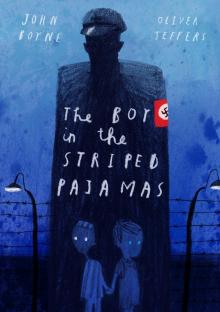 The Boy in the Striped Pajamas
The Boy in the Striped Pajamas Next of Kin
Next of Kin The House of Special Purpose
The House of Special Purpose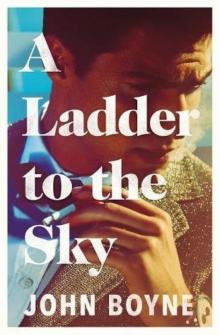 A Ladder to the Sky
A Ladder to the Sky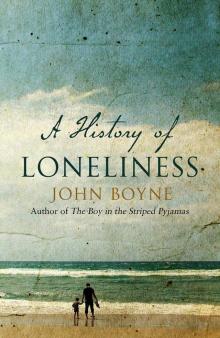 A History of Loneliness
A History of Loneliness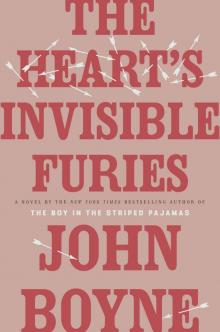 The Heart's Invisible Furies
The Heart's Invisible Furies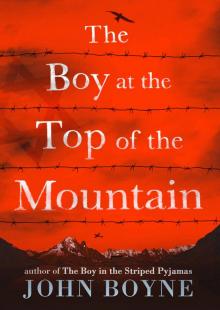 The Boy at the Top of the Mountain
The Boy at the Top of the Mountain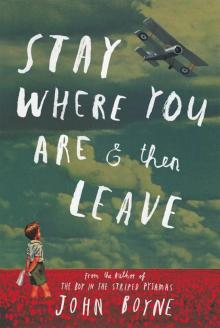 Stay Where You Are and Then Leave
Stay Where You Are and Then Leave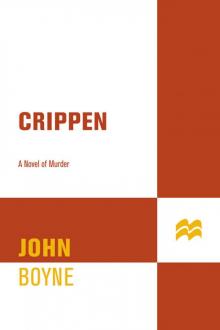 Crippen: A Novel of Murder
Crippen: A Novel of Murder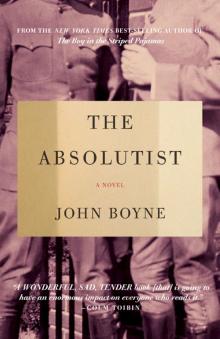 The Absolutist
The Absolutist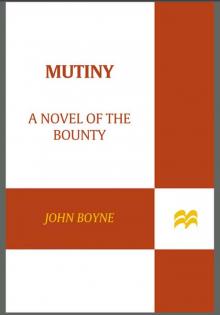 Mutiny: A Novel of the Bounty
Mutiny: A Novel of the Bounty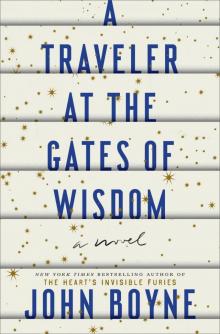 A Traveler at the Gates of Wisdom
A Traveler at the Gates of Wisdom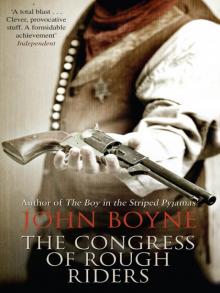 The Congress of Rough Riders
The Congress of Rough Riders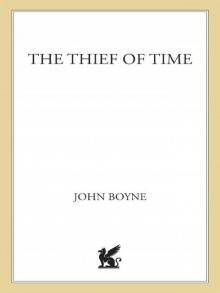 The Thief of Time
The Thief of Time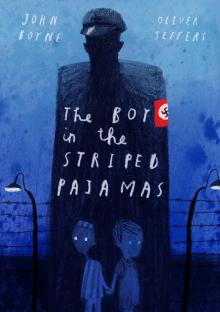 The Boy in the Striped Pajamas (Deluxe Illustrated Edition)
The Boy in the Striped Pajamas (Deluxe Illustrated Edition)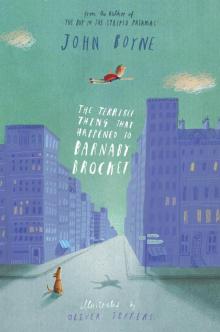 The Terrible Thing That Happened to Barnaby Brocket
The Terrible Thing That Happened to Barnaby Brocket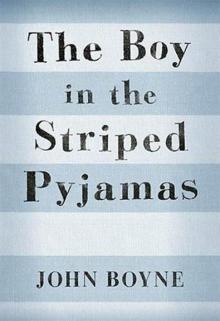 The Boy In The Striped Pyjamas
The Boy In The Striped Pyjamas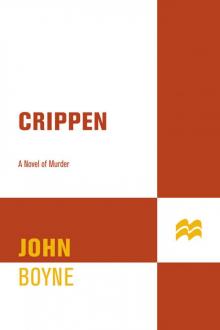 Crippen
Crippen